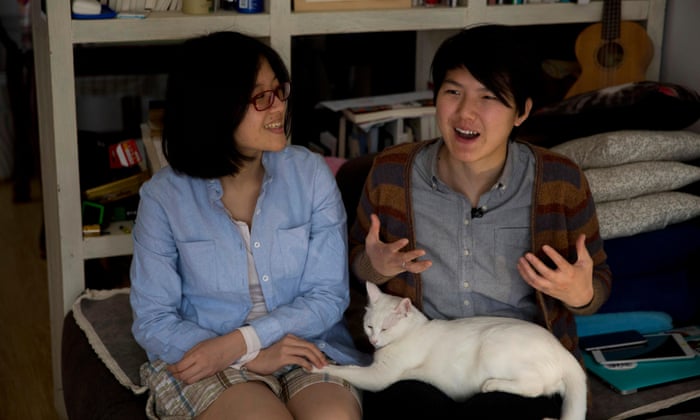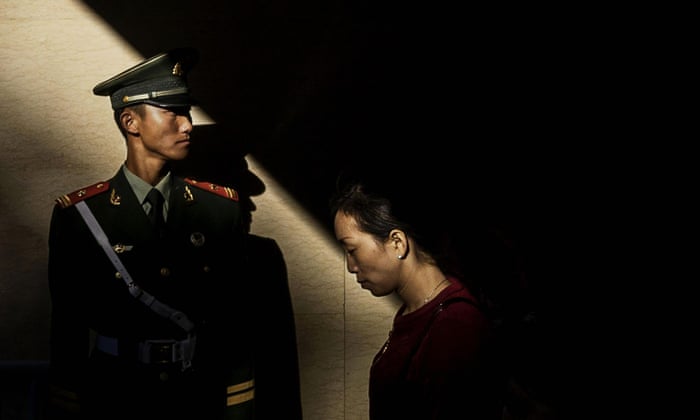The backlash is painful, as women activists manage – slowly – to bring about a change in attitudes
By Li Maizi
By Li Maizi

Li Maizi, right, with her fellow women’s rights advocate Zheng Churan.
I often think of the day I was detained in Beijing.
On the night of 6 March 2015, the police knocked on my door and took me to the station, where I was questioned nonstop for 24 hours.
Later I was sent to a detention centre, where I was held for 37 days.
I was not alone.
I was not alone.
Four other female activists were also arrested.
Though we had planned to hand out stickers on the Beijing subway to raise awareness about sexual harassment, we hadn’t expected our actions to attract the attention of the Public Security Bureau.
Fellow Chinese feminists quickly responded to our detention: they bravely took to the streets with our pictures in the hope of showing the public that we were in danger.
Fellow Chinese feminists quickly responded to our detention: they bravely took to the streets with our pictures in the hope of showing the public that we were in danger.
Thanks to their efforts, Free the Five became an international campaign.
While communist China has officially always promoted gender equality, this incident reveals a different story.
Two years later, is there any hope for the Chinese feminist movement?
Two years later, is there any hope for the Chinese feminist movement?
Definitely, yes.
Since my arrest, there has been both progress and a backlash against women’s rights.
On the one hand, the first legislation against domestic violence was passed in December 2015, an event of huge significance.
Women who have been beaten by their husbands or partners now have the law on their side.
On the other hand, state surveillance of NGOs and feminist activists is increasing, and those who have tried to hold the government to account on human rights abuses have faced crackdowns.
An example of how progress and backlash can coexist is what happened after a well-publicised allegation of sexual abuse.
On the other hand, state surveillance of NGOs and feminist activists is increasing, and those who have tried to hold the government to account on human rights abuses have faced crackdowns.
An example of how progress and backlash can coexist is what happened after a well-publicised allegation of sexual abuse.
When a young girl called Xiao Zhu in Jiangxi province revealed on Xinlang Weibo – a social media platform often compared to Twitter – that she had been sexually assaulted by her father for four years there was an outpouring of sympathy and outrage.
Two women’s rights groups, Women Awakening Network and Yuanzhong Gender Development Centre, gave her legal support.
Local government officials found the attention from activists intolerable and, in less than a week, control of the case was taken over by the local branch of the Communist Youth League.
Local government officials found the attention from activists intolerable and, in less than a week, control of the case was taken over by the local branch of the Communist Youth League.
The father faces up to three years in prison if found guilty, but the priority of the authorities is not justice for victims but social stability.
However, despite the pushback against grassroots organisations, and thanks to women’s issues becoming more prominent on social media, women are becoming more active in the fight against gender discrimination.
However, despite the pushback against grassroots organisations, and thanks to women’s issues becoming more prominent on social media, women are becoming more active in the fight against gender discrimination.
When I was released from detention, I faced a tough decision: should I continue my activism, or give up?
I chose to continue.
Because of China’s two-child policy, abortions are readily available.
If you get pregnant with a third child, abortion is compulsory.
But I don’t see our free access to abortion as a sign of progress, as reproductive rights only apply to married women.
If you are unmarried, it is illegal to give birth and you will face heavy fines.
Some NGOs are calling on the government to grant single women their reproductive rights.
In the era of the one-child policy, the reproductive rights of single women were denied as a means of controlling population growth.
In the era of the one-child policy, the reproductive rights of single women were denied as a means of controlling population growth.
But now, even as propaganda encourages straight couples to reproduce, the state continues to discriminate against single women.
Until recently, single Chinese women over 27 were described as “leftover women”.
Until recently, single Chinese women over 27 were described as “leftover women”.
In 2007, the All-China Women’s Federation (ACWF), the government body dealing with women’s issues, called on women to marry as soon as possible.
This year, however, the ACWF’s newspaper China Women’s News urged the media to stop referring to women as the leftover, a remarkable shift that I believe can be credited to feminist activism.
For activists such as me, it is difficult to work out where the boundaries are.
For activists such as me, it is difficult to work out where the boundaries are.
Last month the Weibo account Feminist Voices was suspended for 30 days.
Our first reaction was to make a big noise so the authorities would feel our rage about this censorship.
The Beijing government continues to push back the boundaries of acceptable resistance to the point where there is little room left, but at least women’s issues are being discussed.
The Beijing government continues to push back the boundaries of acceptable resistance to the point where there is little room left, but at least women’s issues are being discussed.
That’s why there is hope for feminism in China.
